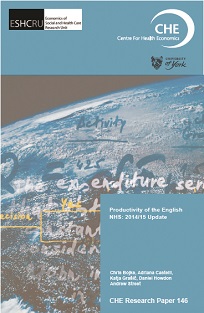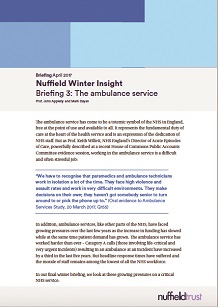News / News review - May 2017
All NHS news in April was overshadowed by the surprise announcement of a general election on 8 June. Recent announcements must be viewed through the lens of a general election campaign and possible outcome. NHS staff will wonder how the election will affect the service, both over the few weeks of the election period and in the long-term once the new government is formed. With early polls giving Theresa May’s Conservative incumbents a convincing lead, will the post-election period turn out to be business as usual? If the Tories are re-elected, will Jeremy Hunt – already one of the longest serving health secretaries – remain in post? What will the election mean for NHS funding, transformation of care and the efficiency programme, including provision of back-office services?

Election pledges on the NHS and political disputes over its services will, doubtless, grab the headlines in the coming weeks, but in April there were continued concerns about the financial position of the service, efficiency and quality.
NHS Improvement announced that Northern Lincolnshire and Goole NHS Foundation Trust had been put into special measures after the Care Quality Commission expressed concern over a number of patient services at the trust. The trust was placed in the financial special measures regime in March and the decision has now been taken to put it into the quality special measures programme after the CQC expressed concern over outpatient, emergency care and maternity services. Also, United Lincolnshire Hospitals NHS Trust has been placed back in the quality special measures regime. It was one of the first trusts to enter special measures for quality reasons in 2013 following the Keogh review and was removed from the programme in February 2015. It has now re-entered the regime after the CQC raised concerns over its services, including an increase in waiting times for follow-up appointments.
The current regulation system offers poor value for money, according to more than half of NHS provider trusts. A survey by NHS Providers found that 56% said regulation was poor or very poor value for money. However, the providers’ organisation said there were signs that national regulators were improving co-ordination of their requests for information. Just over half of survey respondents felt reporting requirements were not proportionate to the level of risk. More than two-thirds of trusts reported an increase in demands from regulators, while a similar proportion said there had been an increase in ad hoc requests.
Though there have been concerns about NHS 
productivity recently – including stories of surgeons with nothing to do, despite long waiting lists, because of lack of hospital beds – the University of York said NHS productivity growth has consistently outpaced the economy as a whole since 2008/09. The university’s Centre for Health Economics said that over the last decade productivity in the health service has increased by 13.83%. Productivity of the English NHS: 2014/15 update said the growth in productivity has been particularly strong since 2009/10, averaging 1.75% year-on-year. Productivity growth was calculated by comparing output and input growth.
Wales health secretary Vaughan Gething allocated funding to 11 projects that aim to improve efficiency through the use of technology. The funding is from a Welsh government technology efficiency fund and the approved projects include: the development of e-forms (a digital version of a paper form) as part of a digital patient record; an improved pressure ulcer reporting system in care homes; and improvements in the diagnosis of gastrointestinal infections.
The Nuffield Trust and Health Foundation said the number of babies and young children admitted to hospital in an emergency has increased by almost a third over the last 10 years. In a report published as part of their joint Quality watch project, they said many children are being hospitalised for conditions such as asthma and tonsillitis. It said these conditions could have been avoided with better care and support in the community.
A spotlight was thrown on ambulance services. 
First, a Nuffield Trust report said the ambulance service in England is facing significant pressure,with rising demand being a factor in the poor morale and high stress levels of the workforce. Despite these pressures, the briefing says ambulance services have maintained and even improved care quality in a number of key areas – from stroke care to heart attack – and innovations such as ‘hear and treat’ have enabled them to improve efficiency.
But there was also a warning that ambulance services face the threat of not being able to communicate with staff in the field. The Commons Public Accounts Committee said the existing Airwave system will become inoperable when a key component of its infrastructure is due to be shut down in March 2020. However, in its second report on the replacement of the system used by police, fire and ambulance services, the committee said the new system – Emergency Services Network (ESN) – had been delayed by nine months until September 2020. The committee said this break was potentially catastrophic and urged the government to engage urgently with the Airwave suppliers to resolve the issue.
Public Health England will play a key role in helping deliver the Five-year forward view prevention and demand management agenda, the government said. Setting out the public health body’s remit for 2017/18, health minister Nicola Blackwood said it would focus particularly on helping to close the health, financial and quality gaps. Public Health England would support the implementation of sustainability and transformation plans; help deliver NHS England’s two-year plan to implement preventative interventions at scale; and develop the use of behavioural science to help people take more control over their health.
Seven mental health trusts have been given funds to pioneer new digital services for patients, NHS England said. For the first time, all key health professionals at the trusts will have access to real time health records. And the trusts will develop remote, mobile and assistive technology to enable patients to manage their conditions and help families and carers offer support. Trusts will have up to £70m – £35m from NHS England and £35m in matched funds.
NHS Resolution – the new name for the NHS Litigation Authority – has published its business plan for 2017/18. It said the plan outlines the first stage in its work to address the rising costs of harm in the NHS (see Healthcare Finance, December 2016). The body said it intends to use its expertise to resolve issues fairly, share learning and ensure more funding is spent directly on patient care.
Quotes
‘Trusts appreciate the changes regulators
have made to improve how they work together, and to co-ordinate how they oversee and support trusts, particularly given the many changes to the regulatory system. But there is much more to do to reduce the demands from regulators and to improve the value they deliver.’
“The consequences of a six-month gap in emergency service communications are unthinkable. The government needs to tackle this now or the result will be a tragedy in waiting.’’
service communications are unthinkable. The government needs to tackle this now or the result will be a tragedy in waiting.’’
PAC chair Meg Hillier (right) calls for urgent action to avoid a breakdown of the emergency services communication system
‘This rate of NHS productivity growth since 2004/05 compares favourably with that achieved by the economy as a whole. Annual NHS productivity growth kept pace with that of the economy up to the recession in 2008/09. Since then NHS productivity growth has consistently outpaced that of the economy, which has stagnated.’
University of York has an upbeat message on NHS productivity in recent years
‘Children and young people are frequent users of emergency services. While not all emergency hospital admissions can be prevented, our research found that, despite some improvements, many children are still treated in an emergency setting for chronic conditions such as asthma.’
Eilís Keeble, Nuffield Trust research analyst says some emergency admissions for children could be avoided
In the media
Before election fever gripped the media, the
House of Lords report on the long-term sustainability of the NHS was one of the key stories of early April. The HFMA was keen to get its opinion across on the report, which slammed short-termism in successive governments and called for an Office for Budget Responsibility-style independent body to keep an eye on demographic changes, future workforce needs and changing skills requirements.
HFMA policy director Paul Briddock (right) backed the report’s call for longer-term health and social care planning and its recognition that an honest public debate on the future of NHS funding was needed (see news analysis).
In a blog for National Health Executive, HFMA research manager Lisa Robertson discussed the emerging governance arrangements in sustainability and transformation plan areas. These were explored in the HFMA briefing Developing sustainability and transformation plan governance arrangements. While each STP will move at its own pace, they will all need to focus on specific areas of governance – finance directors can use the HFMA’s online checklist to ensure they have considered all the key areas, she added.
Last year’s HFMA survey with NHS Providers on mental health funding continues to attract interest. It was quoted in an article on parity of esteem in Mental health today. The article looks at the Mental Welfare Commission annual report, which concluded that pressures on the NHS made achieving parity of esteem difficult without compromising other services.
Related content
The Institute’s annual costing conference provides the NHS with the latest developments and guidance in NHS costing.
The value masterclass shares examples of organisations and systems that have pursued a value-driven approach and the results they have achieved.